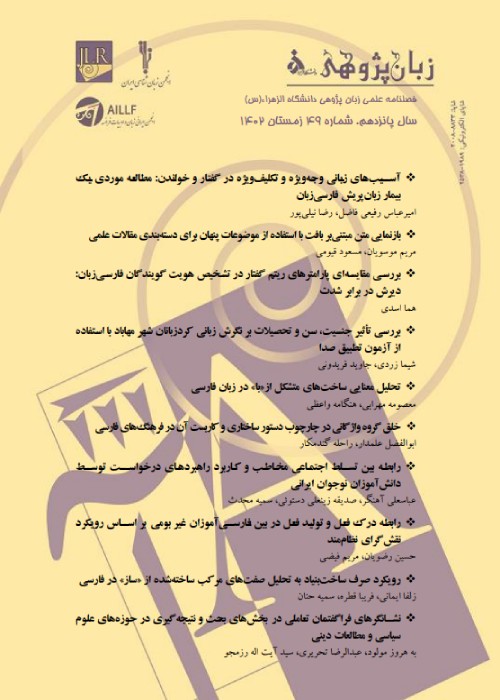The Effect of storytelling on the spoken Language of Children with autism (mild to moderate spectrum)
Autism spectrum disorder is one of the most important disorders affecting children social development, interactions and communication with others (Matlabi, 2016, p. 2). A main problem in autism spectrum disorder children is delay in the onset of speech or lack of speech evolution (Manteghi, 1993, p. 5). Unfortunately, no definitive treatment for this disorder has been proposed. Quick diagnosis and intervention can provide basis for establishment of a suitable and effective educational program that can help these children. Educational systems and approaches are trying to help different people acquire knowledge, skills and attitudes necessary to overcome their problems. Storytelling is an important and old way of teaching and transmitting information to children. It is used as a way to develop the verbal skills of children. Various studies have been done on the linguistic characteristics of people with autism, for example, Jarrold et al. (1997), Kjelgaard and Tager-Flusberg (2001), Ahadi (2016 & 2017), Khalil Khane (2011), Roh Parvar (2014) and Matlabi (2016). In these studies, verbal and linguistic features of patients with autism and their differences with normal children and people with other language disorders and psychiatric disorders were discussed. This study investigated the effect of storytelling on children with autism to enhance their spoken language skills. According to numerous reports on the direct and indirect effects of storytelling in increasing the knowledge, behavioral, verbal and language skills of normal children and improving their verbal, behavioral and educational performance, this study investigated the possibility of using this approach as an educational tool for children with autism. The statistical population of this study was 4-7 year old boys with mild to moderate autism. To eliminate the effect of educational program, differences in the results and also to increase the synergy of the samples, 20 male children (available samples) were selected from children with autism who referred to Nor-e-Hedayat center of Mashhad. Grading of children with autism was performed based on the CARS test. Selected children were randomly divided into two groups: the first group included children with autism disorders that were not trained in the comprehension and production of speech through storytelling, the second group included children with autism who were trained to understand and produce speech through storytelling. Language Development Test (version 3) was used as a tool for determining the effect of storytelling on the spoken language skills of the participants. To this end, the rate of development and spoken language abilities of these children was evaluated by the speech therapist of the center before beginning of the study. Then, 30 appropriate pictorial stories were selected for the age of 3-7 years, and told to the second group of children for three months and every other day for half an hour. At the end of the study, development of spoken language of all children participating in the study was reassessed with the help of the speech therapist in the center. The language Development Test sub-scores were added up and then, the score was converted to other standard score (rate) using the test tables. Afterwards, using the rate table, the score was converted to ranking scores. Statistical analysis of data obtained from the study was carried out using SPSS software version 24. Comparison of linguistic skills between the control and experimental groups was performed before and after the study using Mann-Whitney non-parametric statistical tests and Wilcoxon test was used for intra-group comparisons. The study data showed that there was no significant difference between the spoken language proficiency in the control group before and after the study (p = 0.066), while the spoken language proficiency difference was significant in the experimental group (p = 0.004). Also, by inter-group comparison, the difference between the language proficiency of children in the experimental and control groups was significant after the end of the study and the storytelling process (p = 0.030), while the difference was not significant at the beginning of the study (p = 0.199). The children of the two groups were close to each other in terms of linguistic skills, at the average and lower than average levels, and there was no one with the linguistic level above average. These findings showed that use of appropriate educational stories and having a systematic and continuous storytelling program is effective in increasing language development and language-related systems in children with mild to moderate autism, and, along with other educational and therapeutic programs (such as speech therapy, neurofeedback, etc.), storytelling can be a useful tool to improve spoken skills in children with autism.
- حق عضویت دریافتی صرف حمایت از نشریات عضو و نگهداری، تکمیل و توسعه مگیران میشود.
- پرداخت حق اشتراک و دانلود مقالات اجازه بازنشر آن در سایر رسانههای چاپی و دیجیتال را به کاربر نمیدهد.



